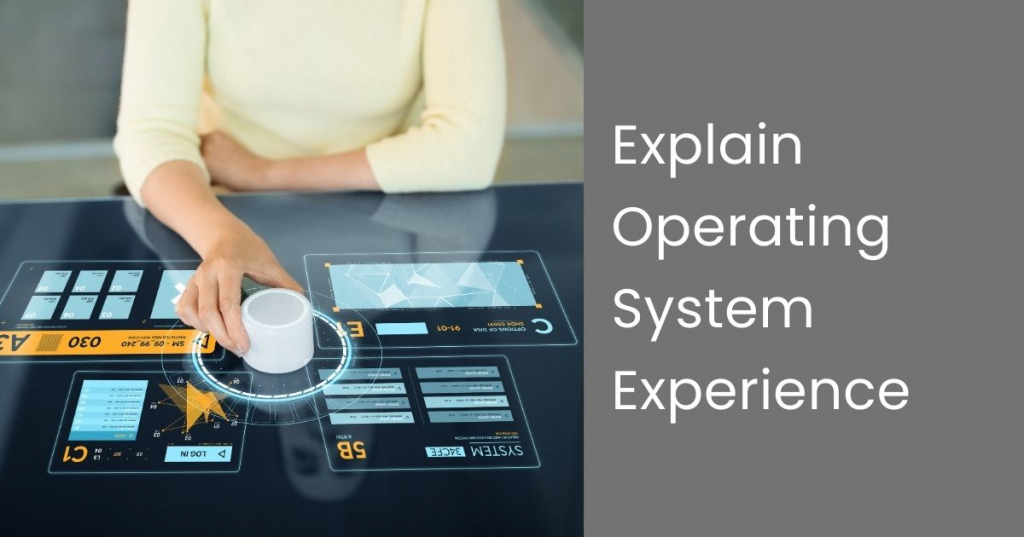OS Interview Questions, How To, and Hints for Your Interview
This comprehensive guide has been compiled by SkillTrans to equip you with the knowledge, hints, and confidence you need to ace your operating system interview. We'll cover everything from essential concepts and preparation tips to common interview questions and insider tips.
Whether you're a seasoned professional or a recent graduate, this resource will help you navigate the intricacies of OS interviews.
Keep reading!
How To Prepare For An Operating System Interview

Preparing for an operating system (OS) interview requires a systematic approach to understanding the fundamental concepts and their practical applications. Here's a comprehensive guide to help you get ready:
Fundamentals
First, to be confident and successful in the interview, you must clearly understand basic knowledge including definitions and core components. Consider reviewing and clearly remembering the following:
Basic Definitions: Clearly understand what an operating system is, its goals (e.g., resource management, providing user interfaces, abstraction), and its different types (e.g., real-time, distributed, embedded).
Core Components: Learn about the kernel (the heart of the OS), processes and threads (units of execution), memory management (virtual memory, paging, swapping), file systems (organization, access methods), I/O management (device drivers, interrupts), and process scheduling (algorithms like FIFO, round-robin, priority-based).
Deeper Dive
Whether you're starting your career or are an experienced professional, a strong understanding of operating systems is crucial for interview success.
For freshers, foundational knowledge of OS is a must. This includes understanding processes, memory management, file systems, and basic scheduling algorithms.
For experienced professionals, the expertise goes beyond the fundamentals. You need to delve into advanced topics like virtual memory, inter-process communication, synchronization techniques, and various I/O models.
Consider learning or reviewing the following knowledge:
Process Management: Understand process states (new, ready, running, waiting, terminated), context switching, inter-process communication (IPC) mechanisms (e.g., pipes, message queues, shared memory), synchronization primitives (semaphores, mutexes), and deadlocks (prevention, avoidance, detection, recovery).
Memory Management: Explore virtual memory in detail (page tables, TLB), demand paging, page replacement algorithms (e.g., LRU, FIFO, Optimal), and memory allocation strategies (e.g., first-fit, best-fit, worst-fit).
File Systems: Study different file system types (e.g., FAT, NTFS, ext4), directory structures, file operations (open, read, write, close), and concepts like journaling (for file system consistency).
I/O Management: Learn about device drivers, interrupt handling, direct memory access (DMA), and buffering.
Security: Understand concepts like user authentication, authorization, access control lists (ACLs), and security vulnerabilities (e.g., buffer overflows, race conditions).
Hands-On Experience
This suggestion is only for experienced, practical experience is an important factor to evaluate whether you meet the job requirements or not. Take statistics and summarize your previous projects, focusing on factors such as:
Use Different Operating Systems: Get familiar with common OSes like Windows, macOS, and Linux distributions (e.g., Ubuntu, Fedora). Explore their command-line interfaces and system utilities.
Experiment with Virtual Machines: Use virtual machines (e.g., VirtualBox, VMware) to install and try out different operating systems without affecting your primary system.
Practice System Administration Tasks: Learn basic system administration tasks like user management, package installation, process monitoring (e.g., using top or ps), and log analysis.
Interview Preparation
Finally, you need to prepare for the interview as best as possible, not only in knowledge but also do the following well:
Review Common OS Interview Questions: Practice answering questions about OS concepts, design choices, trade-offs, and your experience with specific operating systems. (What SkillTrans will provide in the following headings)
Solve OS-Related Problems: Prepare for questions that involve problem-solving or design scenarios related to OS concepts.
Be Ready for Technical Discussions: Be prepared to discuss the architecture and design choices of specific operating systems.
Know Your Resume: Be able to explain any OS-related projects or experiences mentioned in your resume.
How To Explain Operating System Experience In The Interview?

Explaining your operating system (OS) experience in an interview requires a structured approach that highlights your technical skills, problem-solving abilities, and practical knowledge.
Here are suggestions on how you can effectively demonstrate your expertise:
Overview of Expertise
Give an overview of your expertise, giving the interviewer a proper view of your abilities:
Years of Experience: Briefly mention the total duration of your experience working with operating systems.
Primary Areas of Expertise: Highlight the specific areas where you have the most proficiency, such as:
System administration and configuration
Troubleshooting and performance optimization
Kernel development or modification
Device driver development
Security hardening
Specific OS platforms (e.g., Windows, Linux, macOS)
Specific Examples and Projects
Give examples and specific projects you have participated in (this does not require freshers):
Focus on Achievements: Describe specific instances or projects where you successfully applied your OS knowledge. Quantify your achievements whenever possible (e.g. "improved system boot time by 10%", "resolved a critical security vulnerability")
Use the STAR Method: Structure your examples using the STAR method:
Situation: Briefly describe the context of the problem or project.
Task: Explain the specific tasks or goals you were responsible for.
Action: Detail the actions you took to address the situation or achieve the goals.
Result: Highlight the positive outcomes of your actions.
Technical Depth
Demonstrate Understanding: Show that you understand the underlying concepts and mechanisms of operating systems. Use appropriate technical terms (e.g., process management, memory allocation, file systems) and explain them clearly if the interviewer is not familiar with them.
Discuss Challenges and Solutions: Talk about the challenges you faced while working with operating systems and how you overcame them. This demonstrates your problem-solving skills and ability to learn from experience.
Adaptability and Learning
Express Willingness to Learn: Show that you're open to working with new operating systems or technologies outside your primary domain. Emphasize your ability to quickly learn and adapt to new environments.
You can mention the learning sources where you learned about OS to make your words more "credible", and websites that can learn basic knowledge about OS such as Udemy, Coursera, or SkillTrans. Or the in-depth knowledge you have learned in the OS documents.
Examples of How to Explain OS Experience
Here are a few short examples by SkillTrans of how you can explain your OS experience in an interview:
System Administration: "I have 5 years of experience managing Linux servers for a web hosting company. I was responsible for configuring, maintaining, and troubleshooting the servers to ensure high availability and performance. In one instance, I identified a performance bottleneck caused by excessive disk I/O and implemented a caching solution that improved response times by 20%."
Kernel Development: "During my graduate studies, I contributed to the development of a custom real-time operating system for embedded devices. I was primarily involved in implementing the scheduler and memory management components. This experience gave me a deep understanding of how operating systems work at a low level."
Security Hardening: "I have a strong interest in OS security. In my previous role, I conducted regular security audits of our Windows servers and implemented hardening measures to mitigate vulnerabilities. I also developed a security training program for our IT staff to raise awareness about common security threats."
OS Interview Questions For Freshers

For freshers, the questions are usually not too complicated. However, that doesn't mean they are easy questions, questions for freshers can be difficult because they carry a lot of important background knowledge.
Here are 20 Operating System interview questions for freshers, covering both fundamental concepts and potential scenario-based questions:
Conceptual Questions
This comprehensive set of questions is designed to assess a candidate's understanding of operating system theory and their ability to apply these concepts to real-world scenarios:
What is an operating system and what are its primary functions?
Explain the difference between a process and a thread.
Describe the concept of virtual memory and why it's important.
What are the different states of a process?
What are the main components of an operating system?
Explain the concept of deadlock and how it can be prevented.
What is a file system and what are its types?
How does process scheduling work? Name a few scheduling algorithms.
What is the difference between kernel mode and user mode?
What is thrashing and how can it be avoided?
Scenario-Based Questions
In the scenario-based questions section, the interviewer will delve into real-life situations to test your ability to apply operating system concepts in practice. You will be asked to troubleshoot common problems, optimize system performance, and consider design implications for various components:
You have a system with limited memory. How would you optimize it to avoid running out of memory?
How would you troubleshoot a system that's suddenly become slow?
If a process is stuck, how would you find out what it's doing and how to resolve it?
You're designing a multi-tasking operating system. What are the key design considerations for process scheduling?
A system is experiencing frequent crashes. What steps would you take to diagnose and fix the issue?
Explain how you would design a file system for a new operating system.
What are the challenges of real-time operating systems, and how are they addressed?
How would you implement a basic memory management scheme for an operating system?
Describe the steps involved in booting up a computer.
What are the different types of inter-process communication (IPC)?
OS Interview Questions For Experienced

For experienced candidates, questions will focus on specific situations that often occur during OS operations. Additionally, these questions also include many questions about problem-solving and adapting to new technology.
Here are 20 Operating System interview questions tailored for experienced professionals, focusing on more advanced topics and real-world scenarios:
Deep Dive into Concepts
This set of operating systems questions dives into various architectural designs, memory management techniques, and scheduling algorithms.
The questions also cover demand paging and various page replacement algorithms, along with the unique challenges of designing distributed operating systems:
Explain the difference between monolithic, microkernel, and hybrid kernel architectures. What are the pros and cons of each?
Describe the concept of virtual file systems (VFS) and their role in supporting different file system types.
What are the different types of memory fragmentation? How can they be mitigated?
How does demand paging work? Explain the page replacement algorithms you're familiar with.
What are the challenges of designing a distributed operating system, and how can they be addressed?
Explain the concept of atomicity in operating systems and its importance in concurrent programming.
What are the different types of semaphores? How are they used for synchronization?
Describe the difference between preemptive and non-preemptive scheduling.
What are the different types of real-time scheduling algorithms? How do they differ in their guarantees?
What are the security considerations in designing and implementing an operating system?
Real-World Scenarios and Problem-Solving
These questions assess the candidate's practical experience with Linux administration and system design. They cover troubleshooting performance issues, ensuring fault tolerance, load balancing, and security. They also touch on embedded systems, cloud-based OS design, legacy system migration, database optimization, incident response, and the ethical implications of OS design:
You're tasked with optimizing the performance of a heavily loaded Linux server. What tools and techniques would you use?
How would you design a fault-tolerant system that can recover from hardware failures?
Describe how you would troubleshoot a system experiencing high memory usage or CPU utilization.
How would you implement load balancing in a distributed system?
You're leading a team developing a new embedded operating system. What are the key factors you would consider in the design and development process?
How would you design a security model for a cloud-based operating system?
What are the challenges of migrating a legacy system to a new operating system platform? How would you mitigate those risks?
Explain how you would optimize the I/O performance of a database server.
You suspect a system has been compromised. How would you investigate and respond to the security incident?
What are the ethical considerations in designing and deploying operating systems, especially those that collect user data?
Conclusion
By mastering the concepts, strategies, and questions outlined in this guide, you'll be well on your way to conquering your OS interview. With the right knowledge and a calm demeanor, you can showcase your skills and expertise, leaving a lasting impression on your interviewers. As you embark on this journey, keep in mind that every interview is a learning experience.
Regardless of the outcome, each encounter brings you one step closer to your dream job. So, go forth with confidence, apply the insights you've gained, and turn your OS interview into a stepping stone toward a fulfilling career.
Additionally, for those interested in operating systems, SkillTrans offers many free and premium online courses. Explore our Online Learning Catalog to improve your operating system knowledge before your interview!

Meet Hoang Duyen, an experienced SEO Specialist with a proven track record in driving organic growth and boosting online visibility. She has honed her skills in keyword research, on-page optimization, and technical SEO. Her expertise lies in crafting data-driven strategies that not only improve search engine rankings but also deliver tangible results for businesses.



